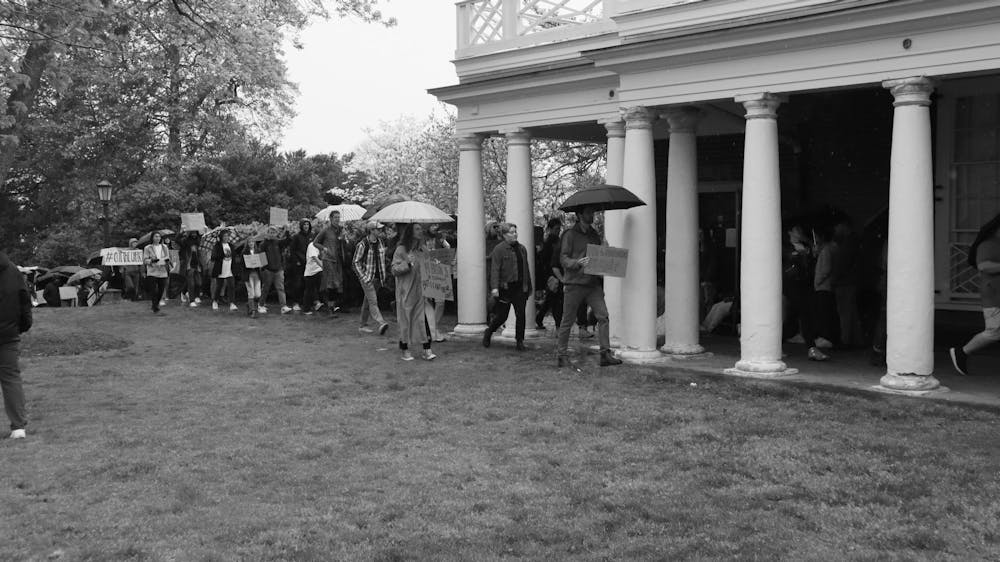More than a year since first sharing their grievances with the University’s administration, graduate student workers continue to report late payments. The University chapter of the United Campus Workers of Virginia, a union representing employees at universities around the state, posted on social media that payments for several graduate student workers, which should have arrived mid-December, came late.
The University told fellowship recipients of the Ph.D. Plus program, an initiative that aims to prepare scholars for long-term career success, that their spring stipends were to begin disbursement Dec. 15. When students received their stipends, they were several thousand dollars below the agreed sum, an issue that was not cleared until Dec. 22. It was later clarified by the University that stipends meant to be distributed as single sums were instead accidentally sent as a smaller monthly payment. While the problem was resolved quickly, graduate students remain concerned about the consistency and frequency of mistakes.
This issue is not new and UCW-VA U.Va. has been vocal in their concerns for over a year. Over 60 graduate students reported receiving late payments in December 2022. The union immediately demanded answers from the University, stating that Student Financial Services was unresponsive to emails from concerned workers, many of whom had to alter their budgets to afford rent.
A majority of the late, incomplete or irregular payments that graduate students reported were for stipends, which are provided to most graduate students to cover living expenses. While the University provides wages to all research and teaching assistants, according to union representatives, wages more often arrive on time when compared to stipends because they fall under payroll and are subject to stricter labor laws. According to the University, roughly 180 stipend payments that were supposed to arrive in December 2022 were received late, with some arriving after Jan. 1, 2023.
Since November, UCW-VA U.Va. has been sharing stories and quotes from affected students on their Instagram. One story, from graduate Arts & Sciences student Jacqui Sahagian, exposed how long these payment issues have been a concern.
“I’ve been paid late more times than I can remember in the last five years,” Sahagian said. “The amount of time I’ve spent contacting admin about my pay truly boggles my mind.”
Laura Ornée, UCW-VA U.Va. chapter chair and graduate Arts & Sciences student, said that the wage and stipend system also represents a larger problem with how the University views graduate students.
“Graduate students are continuously only seen as students,” Ornée said. “Whereas if we were to get all our pay through payroll this would be less of an issue.”
Executive Vice President and Provost Ian Baucom commissioned a task force to investigate the issue in January 2023. It issued its final report in May, providing immediate, short, medium and long term recommendations for actions to resolve the problems with inconsistent payments. So far, all immediate and short term recommendations have been implemented, with three of four medium term recommendations ongoing and the fourth, the creation of a new loan program, complete. Work on long term recommendations, which include changing payment dates for stipends and the development of a central system for graduate financial aid, will begin this semester.
Notably, the task force decided that the cause of the late payments was unrelated to SFS staffing levels, but rather miscommunications of deadlines and overarching bureaucratic delays. They also stated that temporary vacancies in the Graduate School of Arts and Sciences had exacerbated the issue, though the roles had allegedly been filled at the time of the report’s publishing. Ornée noted her skepticism towards the task force’s conclusions, saying that if it were a simple communication or efficiency issue, it could have been solved already.
“It seems that [payment issues] just keep happening,” Ornée said. “So that tells me ‘Okay, you’re missing something, and clearly you’re not able to solve this with the solutions that you proposed.’”
Despite the report and the implementation of several recommendations, the union said that payment issues persisted into the fall semester and held a town hall meeting Dec. 6 to discuss their response, where they questioned the University’s allocation of resources towards new projects, but not towards graduate students.
Low salaries for some administrative positions has led to significant turnover for department financial staff and has required small groups of people to oversee disbursement to a large graduate community. After payment issues in December, the one SFS employee tasked with overseeing graduate disbursements was forced to return from holiday to resolve the issue.
University spokesperson Bethanie Glover said that the University is not aware of any systemic issues leading to students receiving their 2024 Spring funding late. She added that students facing issues with payment should contact administrators.
“Any student who believes that an error has occurred with regard to the payment of stipends or wages is encouraged to reach out to their Director of Graduate Studies and departmental administrators,” Glover said. “They are also encouraged to provide specific information through this issue tracking form, which is monitored by fiscal staff in the Graduate School of Arts and Sciences.”
Ornée said that the union is currently working on their response to the issue, but that students with grievances should reach out to them via social media so that they can track the extent of the problem.





